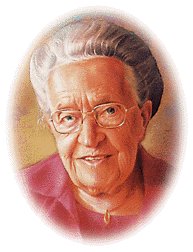THE JOY-FILLED LIFE!
"'Follow me,' a young girl in an officer's uniform said to me. I walked slowly through the gate, never looking back. Behind me I heard the hinges squeak as the gate swung shut. I was free, and flooding through my mind were the words of Jesus to the church at Philadelphia: 'Behold, I have set before thee an open door, and no man can shut it . . . '" -- Revelation 3:8.
On December 28, 1944, after ten months of incarceration in concentration camps, Corrie Ten Boom was free. She had lost her father and beloved sister to the horrors of Nazi death camps. Gaunt, filthy, and weak, Corrie made her way to the railway station and boarded a train for a three-day journey home to Holland.
She later found out that an order had been given at the end of that very week to kill all women her age and older. An error in prison paperwork was the catalyst God used to release her.
The Ten Booms, all devout Christians, had provided a hiding place in their home for persecuted Jews during World War II. Corrie, who was fifty-nine at the time of her arrest, was placed in an isolation cell for the first few weeks of her imprisonment. Depression and the struggle to maintain a sense of hope consumed her.
"Only to those who have been in prison does freedom have such great meaning. When you are dying—when you stand at the gate of eternity—you see things from a different perspective than when you think you may live for a long time. I [stood] at the gate for many months, living in Barracks 28 in the shadow of the crematorium.
"Every time I saw the smoke pouring from the hideous smokestacks I knew it was the last remains of some poor woman who had been with me in Ravensbruck. Often I asked myself, 'When will it be my time to be killed or die?'"
Corrie vowed if God allowed her to live, she would tell as many people as possible about the love and forgiveness of Jesus Christ. She also promised to go wherever He led. She miraculously obtained a small New Testament from a prison worker and smuggled it past guards.
"Before long we were holding clandestine Bible study groups for an evergrowing group of believers, and Barracks 28 became known throughout the camp as 'the crazy place, where they hope.'"
No one is exempt from the fiery trials of life. All of us face times of adversity and suffering. For Corrie, the concentration camp was the fieriest place of all, becoming her classroom where she lived and learned the faithfulness of God. It was there she learned the faithfulness of God. It was there she learned to hide her life under the shadow of His wings while He trained her for a much higher calling.
"The school of life offers some difficult courses, but it is in the difficult class that one learns the most—especially when your teacher is the Lord Jesus Christ. The hardest lessons for me" wrote Corrie, "were in a cell with four walls. The cell in the prison at Scheveningen was six paces in length, two paces in breadth, with a door that could be opened only from the outside . . . After that time in prison, the entire world became my classroom."
God gave her a promise, telling her that she would reach far more people than she could imagine with the gospel message. For the next four decades following her release from prison, Corrie traveled extensively, speaking in more than sixty countries, captivating audiences with her inspiring faith and love for God. She is the author of nine books, one of which is The Hiding Place, a personal account of her arrest and time spent in prison. She also produced five films.
"God has plans—not problems—for our lives. Before she died in the concentration camp in Ravensbruck, my sister Betsie said to me, 'Corrie, your whole life has been a training for the work you are doing here in prison—and for the work you will do afterward.'
"The life of a Christian is an education for higher service. No athlete complains when the training is hard. He thinks of the game, or the race. Romans 8:18-23.
"Looking back across the years of my life, I can see the working of a divine pattern which is the way of God with His children. When I was in a prison camp in Holland during the war, I often prayed, 'Lord, never let the enemy put me in a German concentration camp.' God answered no to that prayer. Yet in the German camp, with all its horror, I found many prisoners who had never heard of Jesus Christ.
"If God had not used my sister Betsie and me to bring them to Him, they would never have heard of Him. Many died, or were killed, but many died with the name of Jesus on their lips. They were well worth all our suffering. Faith is like radar which sees through the fog—the reality of things at a distance that the human eye cannot see."
Perhaps you have been struggling with a fiery trial in your life. The pressure seems unbearable and there appears to be no way out. You may even be trapped in your own emotional prison. For Corrie Ten Boom the only place of refuge, the only place of hope, was within the shadow of God's wings. That is where our hope lies also. No matter what has touched your life, nothing is too big for Jesus Christ to handle.


<< Home